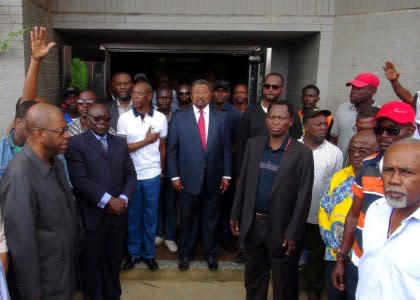Tense Gabon braces for disputed election result

Thomson Reuters
By Gerauds Wilfried Obangome
LIBREVILLE (Reuters) - Gabon was braced on Wednesday for an election result that looks likely to be hotly disputed between bitter rivals President Ali Bongo and his main challenger Jean Ping.
The electoral commission was scheduled to release the results on Tuesday evening, but by 5.30 a.m. (0430 GMT) the following day, the panel was still in a closed-door meeting.
Gabonese have become increasingly nervous about the delay in delivering the results, as well as claims by Ping to have won by 60 percent.
State TV repeatedly played comments from the government warning Ping's supporters that announcing results before the electoral commission was illegal, interspersed with music and a documentary about Nelson Mandela played on a loop.
The government accused Ping on Tuesday of trying to destabilize Gabon.
"After the results, we will hand over these instances to the Gabonese judicial authorities," the government warned in its statement, read out by several officials.
It also denounced what it said was "foreign interference", after the French socialist party and two French lawyers publicly said Ping had won.
With both sides trading accusations, many fear an intractable political crisis.
U.N. Secretary General Ban Ki-moon on Tuesday expressed concern about the issue of premature results and asked Ping and Bongo to urge restraint on their supporters.
"Jean Ping's victory is no longer in doubt," a statement signed by Ping said late on Tuesday, estimating his win at about 60 percent verses Bongo's 40 percent.
A win by Ping, a former foreign minister, African Union Commission chairman and longtime political insider, would end half a century of rule by the Bongo family.
Bongo was first elected in 2009 after the death of his father, Omar Bongo, who ran Gabon for 42 years. [L8N1BA2H0]
Authorities have also reacted angrily to an app set up by a political adviser to Ivory Coast's President Alassane Ouattara that allegedly gives live results by region, which they said were hacked and falsified. Ouattara's office responded by sacking the accused individual, Mamadi Diane.
Gabon's first-past-the-post system means the winner only needs more votes than any other candidate. Bongo, 57, also benefits from being the incumbent in a country with a patronage system lubricated by oil largesse.
The European Union's observer mission on Monday criticized a "lack of transparency" among the institutions running the polls and said Bongo had benefited from preferential access to money and the media. Government spokesman Alain-Claude Nze accused the EU of overstepping its mandate.
Gabon's economic troubles, caused by falling oil output and prices, have fueled opposition charges that its 1.8 million people have struggled under Bongo's leadership.
(Additional reporting by Matt Bigg in Accra and Tim Cocks in Dakar; Writing by Tim Cocks; Editing by Clarence Fernandez)
See Also:

 Yahoo Finance
Yahoo Finance 
